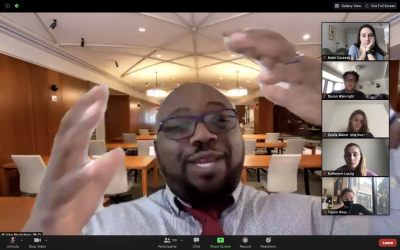Kathryn Kennedy, Trinity College

More than 100 faculty, staff and students paused amid the relentless pace of the fall semester to gather and reflect on finding purpose, the Duke academic experience and the challenge of systemic racism as part of an annual event hosted by Service-Learning.
“The Fierce Urgency of Now” – its title a reference to a quote from Martin Luther King Jr. – featured more than an hour of frank discussion, frequently punctuated by student voices and featuring Dean of Students John Blackshear and Martin Smith, Dean of Academic Affairs for Trinity College of Arts & Sciences.
“Today, we want to put that (King) quote in the context of our own personal lives, our lives as members of the Duke community, our lives as citizens and a global perspective,” said Service-Learning Director David Malone as he opened the Oct. 28 virtual conversation.
They first touched on topics universal to the undergraduate experience. Students were asked whether they feel Duke sees them as a statistic or as an individual with a story. Audience polls conducted in real time indicated the former. And they discussed what it means to promise and provide a “transformational” educational experience.
“I feel like there’s a Duke way,” Smith remarked. “You’ve got to double major, you’ve got to do this and that and then you’ve got to end up on Wall Street. But we’ve all got to end up in our own unique place.”
“Where your passion, where your purpose, where your skill set aligns, that’s where you need to go…and move forward unapologetically.”
Blackshear encouraged students – within the limits of COVID – to engage with others often and to be open to new perspectives.
“When we take advantage of living proximate to 10,000 stories…it can have a transformational impact on how we think, what we believe is truth,” he said. “If you exit Duke thinking and understanding only the same things you did when you arrived here, we did not do our job.”
Students then talked about the impact of COVID-19 on Duke, sharing how the loss of fall break is wearing them down. The traditional freedom and discovery of the first-year experience – and their first time away from home – is limited, some said. Meanwhile, an upperclassman expressed that she and her peers never had a chance to reflect on what they’ve lost to COVID.
“College is always hard but it’s hard in different ways than it was for me,” Smith said. “I wasn’t in college in a pandemic. How can we build in things that encourage camaraderie? Encourage that Duke spirit?”
“There are a lot of conversations going on about your physical health and safety and your mental health and safety,” he added. “I hope it manifests and feels very different in the spring.”
The afternoon’s discourse culminated in a passionate exchange about anti-racism, with students questioning whether Duke can move beyond words to action. They asked that Duke more widely acknowledge its history and the systems by which the institution has benefited. Others suggested requiring courses focused on social justice. But the deans also advised they look inward.

“If you’re going to be an anti-racist, that requires work every day,” Blackshear cautioned. “That requires self-reflection. The work of this moment is not going to be a program. Look at your history; look at your heroes. They didn’t host seminars. They did the work.”
“You have people being killed on camera; choked out in the street,” Smith said, his voice heavy with emotion. “We protest for a second, we get riled up…but I put my shirt and tie on and I teach class and I become a dean for the day.”
“I think – myself included – we have to have a stronger moral conviction, and we have to have more courage,” Smith continued. “I think we’re pretty privileged to sit at Duke and talk like this. ‘What is administration going to do?’ I am going to echo what Dean Blackshear said: What are you doing?”
Malone closed the event by commenting on a question he is posing frequently these days: Is this is a moment or is it a movement?
“We cannot allow this to just be a moment,” he said, offering his personal take. “There is no return to normal. Normal is no longer desirable, and the old normal was never the best version of ourselves.”